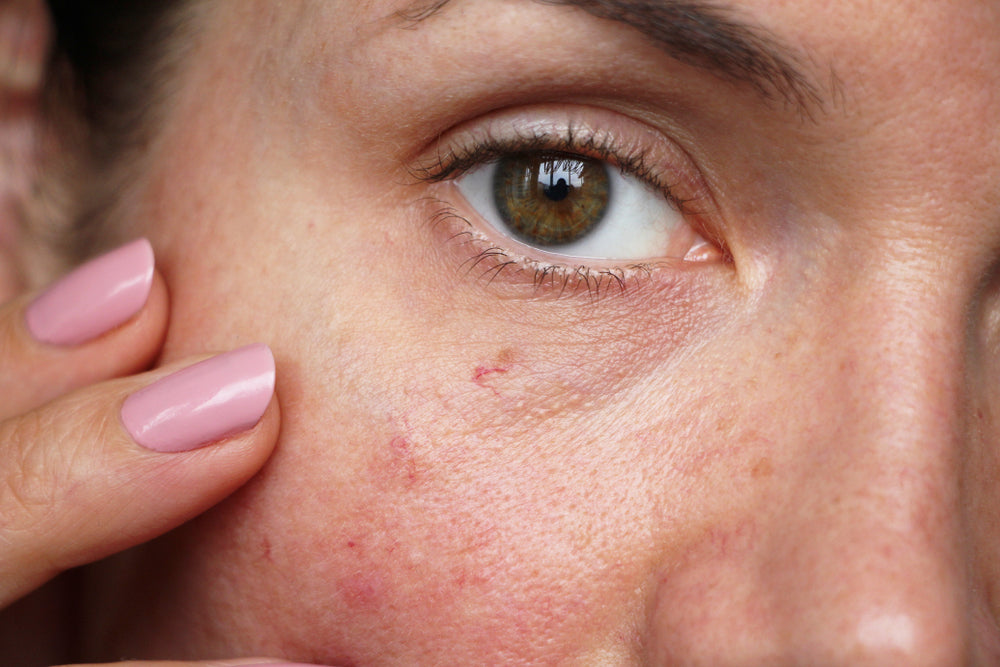
What Does Sensitive Skin Really Mean?
As you may or may not know, the skin is our body’s largest organ. And just like us, our skin can get sensitive at times. We as hoomans show emotional sensitivity in a vast array of creative fashions at times. If we’re not crying at our favourite rom-com, we’re probably getting easily displeased over just about anything. Keep in mind, having particular sensitivities isn’t a bad thing, it just means we are quick to respond to certain signals.
Like most personality characteristics, having knowledge of the quirks of a sensitive person makes them easier to understand. So in order for us to start understanding why our skin is being so sensitive, we need to have a little know-how when it comes to our own skin quirks.
What is the skin’s barrier?
Your skin’s barrier is the outermost layer of the skin that serves as a protective shield against harmful microorganisms. Typically, how oily or dry our skin appears to be, even how sensitive it is, is determined by our skin’s barrier and its overall condition, not just genetic predispositions. The skin barrier can be at the root of most skin conditions. It is like a brick wall, with each brick being held in place by a lipid (the nerdie term for fat), and it keeps the good in and the bad out. In short, we need to protect that barrier, as without it, irritants can get to our skin much more easily.

Is sensitive skin a skin type?
One myth related to sensitive skin is that it is a skin type when in fact it is more in line with being a skin condition. Sensitive skin is similar to dry skin in that it is genetic - something you’re simply born with. Sensitive skin is therefore much more easily inflamed inherently and much more susceptible to reactions. The skin is dealing with chronic irritation from the inside and is presenting a heightened awareness of the skin’s state. Just like our emotional states, sensitive skin can be easily triggered! The most common denominator with sensitive skin is inflammation. Hoomans with sensitive skin will notice that they are prone to spots, redness, rosacea and itchy skin - not ideal!
What’s the difference between sensitive skin and sensitised skin?
If we want to learn about sensitive skin, then we need to know what is not sensitive skin.
Sensitised skin is something which caused by our lifestyle choices. Unlike sensitive skin, it is not genetic, and can be nipped in the bud and fixed! Some examples of lifestyle choices that cause sensitisation are the overuse of exfoliating products, or the use of very harsh products, or neglecting the skin as an organ in general, by not protecting it from sunlight, for example.
If your skin suddenly starts to reject certain ingredients after years of accepting them with open arms, it may mean your skin is sensitised. If your skin is sensitised, it may look thin, feel tight after cleansing and may be red, scaly or bumpy.
What hoomans with sensitive skin should avoid:
- Overly fragranced products, whether with synthetic fragrances (listed as parfum or perfume) or with essential oils
- Products high in drying alcohols; denatured alcohol (alcohol denat.), SD alcohol
- High amounts of glycolic acid or salicylic acid - not worth the risk with very sensitive skin, unless it has been deemed okay by your Nerd or Nerdette
- Chemical sun filters such as oxybenzone, octinoxate and octocrylene - although this isn’t true for all, many very sensitive hoomans find that these ingredients can cause irritation
What hoomans with sensitive skin should reach for:
- Good skin fats like ceramides, grapeseed oil and sunflower seed oil - these ingredients help to feed and protect your “wonky” barrier
- Retinyl palmitate aka the fat form of vitamin A - retinyl palmitate seals and heals without causing the same irritation that a retinol may cause in those with sensitive skin
- Anti-inflammatory and anti-irritation ingredients such as oat extract, calendula extract, green tea extract, lycopene, aloe vera extract, cucumber extract (and others)
- Mineral sun filters in SPF, namely zinc oxide or titanium oxide, found in Murad City Skin SPF 50 (€70.00), for example
- Polyhydroxy acid or PHA - an exfoliating acid with a very large molecule so as not to irritate sensitive skin yet still highly effective, works to build barrier and has antioxidant properties!
- Low dosages of lactic acid, another large molecule exfoliating acid which is super hydrating, found in Gallinee La Culture Foaming Facial Cleanser (€16.50)
- An anti-inflammatory diet, low in inflammatory foods like refined sugars, red meat and white carbs and high in anti-inflammatory food such as tomatoes, leafy greens and berries, is often said to help with those with easily inflamed skin… Time for a Summery superfood salad, we say
Those with sensitive skin and inflammatory skin conditions should never neglect to patch test! Before you use a new product, apply a small amount of it either behind your ear or on your arm and wait for 24 to 48 hours to see if your skin reacts. If not, you’ve got a great indication that it won’t annoy your hot-tempered skin!
If you have sensitive skin, remember that you can always get in contact with us before adding a new product to your routine or get advice about what to add to your routine. Just pop us an email at consult@theskinnerd.com!
